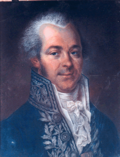| No. | Portrait | Name | Term [a] | Government | Head of State | Ref. |
|---|
| Took office | Left office | Time in office |
|---|
| Ministry established |
| [b] |  | | Armand-Gaston Camus | 2 January 1796
12 Nivôse Year IV | 4 January 1796
14 Nivôse Year IV | 2 days | Directory | Directory | [2] |
| 1 |  | | Philippe-Antoine Merlin | 4 January 1796
14 Nivôse Year IV | 3 April 1796
14 Germinal Year IV | 90 days | [3] |
| 2 |  | | Charles Cochon de Lapparent | 3 April 1796
14 Germinal Year IV | 16 July 1797
28 Messidor Year V | 1 year, 104 days | [4] |
| 3 |  | | Jean-Jacques Lenoir-Laroche | 16 July 1797
28 Messidor Year V | 26 July 1797
8 Thermidor Year V | 10 days | [5] |
| 4 |  | | Pierre Jean-Marie Sotin de La Coindière | 26 July 1797
8 Thermidor Year V | 13 February 1798
25 Pluviôse Year VI | 202 days | [6] |
| 5 |  | | Nicolas Dondeau | 13 February 1798
25 Pluviôse Year VI | 16 May 1798
27 Floréal Year VI | 92 days | [7] |
| 6 |  | | Marie Jean François Philibert Lecarlier | 16 May 1798
27 Floréal Year VI | 29 October 1798
8 Brumaire Year VII | 166 days | [8] |
| 7 |  | | Jean-Pierre Duval | 29 October 1798
8 Brumaire Year VII | 23 June 1799
5 Messidor Year VII | 237 days | [9] |
| 8 |  | | Claude Sébastien Bourguignon | 23 June 1799
5 Messidor Year VII | 20 July 1799
2 Thermidor Year VII | 27 days | [10] |
| 9 |  | | Joseph Fouché | 20 July 1799
2 Thermidor Year VII | 18 May 1804
28 Floréal Year XII | 4 years, 303 days | [11] |
| Consulate | Napoléon Bonaparte |














